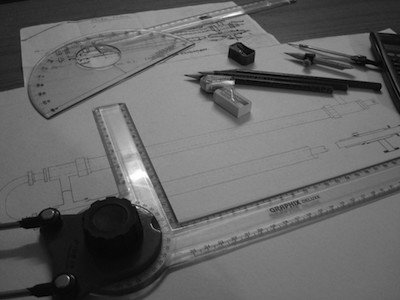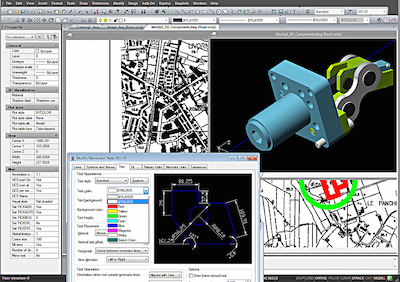
via Wikimedia Commons
Without engineers, the world wouldn’t go round. I suppose, then, that a thanks is in order. Thanks, engineers. Really. Designing, drafting, and constructing many of the systems and infrastructure we take often for granted on a day-to-basis, from roads and bridges to iPhones and NASA rockets, engineers have planned most of the man-made world around us. Degrees in engineering are often comprised of a Bachelors of Science degree with an additional specialized field, of which there are many, ranging from Biomedical and Mechanical to Civil and Electrical Engineering. Applying a strong foundation in science and mathematics to real-world problems, engineering students create solutions and improvements to most facets of our daily lives. Essentially, engineering majors work to cultivate a well-versed background to solve problems for companies in just about any industry, making them a much-wanted position to most any company.
Unlike those disciplines in the social sciences and humanities, career paths for Engineering students are generally clear-cut and some of the more well-paying out of the gate.
In the 2010-11 academic year, 76,367 engineering degrees were granted of the total 1,715,913 given in total, or about 4.45%.
Because of the wide variety of specialized opportunities within the Engineering major, there are quite a few different job fields for engineering majors to enter into, and this specialization leads to a high demand for skilled engineers. As a result, the job outlook for many engineering-related positions is favorable, starting salaries comparatively high, and high levels of growth in pay.
The median salary for Engineering-related career choices range from $51,660 (Elementary School Teacher) to $119,260 (Engineering Manager). Most of these occupations require a Bachelor’s degree, though others – such as Teaching at the University Level and Urban Planning require further post-graduate study.
In solving the problems that come up in an undergraduate Engineering degree – whether studying electrical circuits, architectural soundness, or how to more efficiently water agricultural crops, most Engineering situations require mathematical calculations, leading to a prevalent numerical literacy and mathematical prowess for those that study Engineering.

ProgeCAD 2013 screenshot via Wikimedia Commons
In bringing planned Engineering concepts to life, students often use complicated and in-depth Engineering software tools. Consequently, Engineering students are notably proficient computer users. Whether using Excel for statistical spreadsheets or AutoCAD for highly complex, 3-Dimensional rendering, the computer skills of Engineers often translate directly into the functions performed in entry level jobs. You couldn’t have finished an Engineering degree without the use of computers, and you’ll continue to use them as you begin your career.
The processes in involved in identifying problems, conceptualizing solutions, drafting solutions, and finally producing and testing a solution is not so far a cry from the scientific method itself. Engineering students learn to proceed according to strict sets of criteria for their projects and must pay incredibly close attention to detail in their work. While your work in the undergraduate setting may be more theoretical, or built on a smaller scale, the problems you’ll be tackling in your career after graduating can – and often do – have human lives at stake, and it’s important that Engineers work with this in mind.
While some think of engineering as a somewhat dry discipline, Engineers truly develop and flex creative muscles. While some of the solutions designed by Engineers seem so simple, they are truly far from it, and it takes a great degree of creative, critical thinking in order to envision them. Some of the most ingenious inventions are those that are right before your eyes.
Entry level opportunities for Engineering Majors are highly variable, and usually correlate with a focused area of study during the time working towards a Bachelor’s Degree. That is to say, one does not look for entry level Engineering jobs in general, but instead entry-level positions in Mechanical, Civil, Electrical, Engineering positions and so on.
As such, you’re likely better off checking out our engineering career guide for more in-depth information about the work of an Engineer.
Make sure you’re well versed in the software suite that corresponds with your area of interest inside the Engineering program at your school. In addition, other disciplines and courses can work to supplement the efficacy of your engineering degree. While some are likely required within a given program, courses in areas such as drawing, architecture, physics, and upper level mathematics can help you to become a well-rounded and highly capable engineer right out of the gate.
| Field Service Engineer RecruitMilitary Placement Services Columbus, OH | View |
| University Engineer Ohio State University Columbus, OH | View |
| Project Engineer Insight Global New Albany, OH | View |
| Associate Engineer Planet Pharma New Albany, OH | View |
| Structural Engineer Omni One Columbus, OH | View |
| Power System Application Engineer TATA Consultancy Services Columbus, OH | View |
| Encryption Services Engineer (Remote) New Mexico Staffing Columbus, OH | View |
| Encryption Services Engineer (Remote) Nebraska Staffing Columbus, OH | View |
| Automation Engineer 5 CDM Smith Columbus, OH | View |
| Controls Estimator II Trane Technologies Columbus, OH | View |